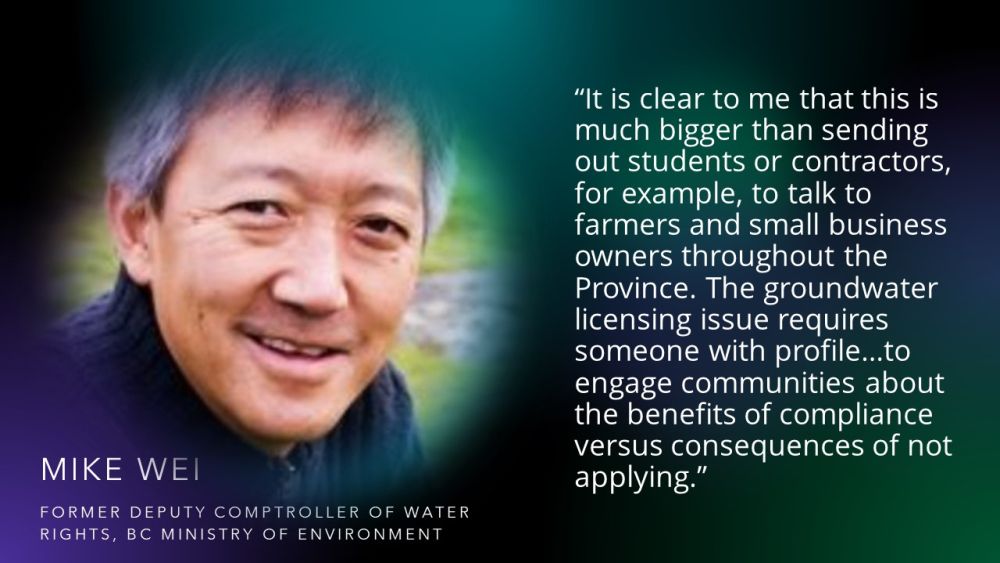COUNTDOWN TO MARCH 2022 DEADLINE: “Existing groundwater users who have not applied by the deadline will be unlicensed and must stop using groundwater after March 1, 2022, until a licence is obtained,” forewarns the latest Information Bulletin from the Government of British Columbia (September 2021)
Note to Reader:
On September 21, 2021, the Partnership for Water Sustainability in BC’s Waterbucket eNews featured the groundwater licensing regulation, a foundation piece for successful implementation of BC’s Water Sustainability Act (WSA), passed in 2016. The WSA is once-in-a-generation, transformational legislation. The 6-year transition period for groundwater licensing ends on March 1, 2022. With six months to go, the dilemma is that a mere 1 in 5 small business owners and farmers who rely on groundwater have applied for a licence. This is a looming crisis with far-reaching ramifications for the BC economy.
On September 25, 2021, the provincial government issued an Information Bulletin titled Six months remain for groundwater users to apply for licence. It is reproduced below in combination with the second Groundwater Licensing Primer produced by the Partnership for Water Sustainability.

Six Months Remain for Groundwater Users to Apply for Licence
“A deadline for select groundwater users is less than six months away. March 1, 2022, is the deadline to apply for a water licence for those who were using groundwater from a well or dugout on or before Feb. 29, 2016, for non-domestic purposes such as irrigation, commercial or industrial use,” stated the Information Bulletin which was released by the Ministry of Forests, Lands, Natural Resource Operations and Rural Development (FLNRORD). Staff from the Ministry of Environment and Climate Change Strategy are working hard behind the scenes to provide FLNRORD staff with policy support.
“A water licence is not required for a household well or groundwater used for domestic purposes, such as watering lawns and gardens. Domestic groundwater users are encouraged to register their well for free.”
Consequences of Missing the Deadline
“Existing groundwater users who have not applied by the deadline will be unlicensed and must stop using groundwater after March 1, 2022, until a licence is obtained. They will be treated as a new user and will not receive recognition for their historical date of first use. That historical date is important because during water shortages, older licences get priority access to water.”
“Missing the deadline could be costly and may include fines for unlicensed use of groundwater. Late applications will not benefit from the waived application fee and may require costly studies to support an application. Application fees are waived for existing groundwater users who apply before the deadline.”
“In response to feedback, the Province has made an effort to improve the online application. Applicants are recommended to have several key pieces of information ready when making an online application to help the process go as smoothly as possible. For example, the well’s location, depth and construction, property and water use, evidence of when groundwater was first used, history of use from the well and other information about water use and works.”
“Groundwater is water naturally occurring below the surface of the ground. Licensing groundwater helps protect aquifers and streams, along with businesses and livelihoods that depend on reliable access to water. B.C.’s water licensing system is a fair and transparent process that helps reduce conflicts between water users, particularly in times of drought and water scarcity.”
“There may be consequences for businesses if they miss the March 1, 2022, deadline to apply for an existing use groundwater licence,” concluded the Information Bulletin.

Primer on Groundwater Licensing is a Call to Action
“The Partnership for Water Sustainability is committed to doing its part to get the message out about managing groundwater sustainably for future generations. In September 2021, the Partnership released its second Primer on groundwater licensing implementation. It is a compendium of very persuasive and informed opinions from people who have expert knowledge and really understand the issue,” stated Kim Stephens, Executive Director, Partnership for Water Sustainability.
“This is not a technical report. Because people learn through stories and anecdotes, the Primer storyline is built around quotable quotes by a trio of knowledgeable professionals to tell the “story behind the story”. Ted van der Gulik, Mike Wei and Donna Forsyth had long-term service in government. In Part One, we reproduce the government’s July 2021 Information Bulletin. This is the springboard to Part Two on true risks of not applying for a water licence. In Part Three, the Partnership suggests game-changing solutions.”
To Learn More:
Download a copy of Living Water Smart in British Columbia: Groundwater Users Put on Notice. Posted to the waterbucket.ca website in July 2021, this second of two Primers provides context and perspective on the value of a water right and why it is worth the time and effort by farmers and small businesses to APPLY RIGHT NOW for a water licence.
BC Government Online Resources
- To learn more about water licences, visit:
https://www2.gov.bc.ca/assets/gov/environment/air-land-water/water/gwlicensingqas-2020.pdf - Apply online: https://portal.nrs.gov.bc.ca/web/client/-/secure-your-water-rights-today
- “How to apply video” using irrigation as an example:
https://www.youtube.com/watch?v=zoYMs5OZMHc - Register a domestic well:
https://www2.gov.bc.ca/gov/content/environment/air-land-water/water/groundwater-wells-aquifers/groundwater-wells/well-records-registration - For more information, contact FrontCounter BC: https://portal.nrs.gov.bc.ca/web/client/contact
https://www.youtube.com/watch?v=zoYMs5OZMHc


